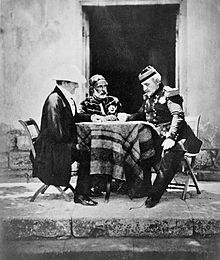Omer Pasha Latas
Omer Pascha Latas (also Omar Pascha or Ömer Lȗtfî Pascha ; born November 24, 1806 in Jasenica near Plaški , Ogulin district as Mihajlo Latas ; † April 18, 1871 in Istanbul ) was an Ottoman field marshal of Serbian descent.
Life
Omar Pascha was born in the Croatian military border region, a border area between the Habsburg Empire and the Ottoman Empire (now Croatia ). His father was an administrative officer of the Ogulin district. Omar Pascha joined the Ogulin border regiment of the Austrian army as a cadet . He deserted in 1828 because his father was dismissed, entered the service of the Turkish governor Hussein Pascha in Bosnia (then part of the Turkish Empire) and became the educator of his children after converting to Islam . With recommendations from the same he went to Constantinople , the capital of the Turkish Empire, in 1834 , where he found a job as a clerk in the War Ministry.
Soon afterwards, Omer Efendi, as Latas now called himself, was chosen to be the writing teacher of the prince and later sultan Abdülmecid I and at the same time accepted into the Turkish army with the rank of Yüz Başı (captain) . He rose rapidly from step to step, and as early as 1839, as Colonel (Bey), he was given command of a corps sent to what was then Turkish Syria against the rebellious Ibrahim Pascha , with which he defeated the far superior enemy at Beksaya.
In 1842 he was entrusted with the military government in Lebanon , which was then Turkish , but soon had to resign because of too many complaints from Christians about the severity of the renegade against them. In 1843, under the command of Mustafa Reşid Pasha , he took part in the campaign in Albania against the rebel Dschuleka, whom he captured, and in 1846 he was given command against the rebellious Kurds , which he subjugated again. When the unrest broke out in the Danube principalities occupied by the Turks in 1848 , he occupied them together with the Russians and remained as military governor in what was then the Turkish city of Bucharest until April 1850, after which he suppressed an uprising in Bosnia .
In June 1853, the Russian Tsar Nicholas I ordered his troops to march into the Danube principalities and thus opened the Crimean War . Omer, meanwhile appointed Pasha , then advanced against the Imperial Russian Army on the Danube and won the first victory in the Battle of Oltenița on November 4th. The Russian prince Ivan Paskewitsch began on April 14, 1854 with the siege of the strategically important fortress Silistra . Omar Pascha brought up a relief army on June 10 and was again victorious in the fighting off Silistra. The Russians had to give up the siege of Silistra after 55 days on June 23rd. Omar Pasha entered Bucharest on August 22nd . In September 1854 he was ordered to the Crimea with 30,000 Turks in support of the Allied British and French . There he took part in the siege of Sevastopol . When the Russians began to siege the Kars fortress in June 1855 , Omar Pasha informed the Allies on July 11, 1855 that he would move his troops from Crimea to Asia Minor. The Allies were against this decision and only approved the plan in September. Omar Pasha's diversionary attack on Kutaisi was eventually foiled by General Bebutov .
Appointed Turkish governor of Baghdad , he fell out of favor in 1859 because he had exceeded his authority several times and was banished after Kursput. Recalled to Constantinople in 1861 , he was given supreme command in Herzegovina , where he suppressed the uprising in 1862 and successfully waged the war against Montenegro . In 1864 he was appointed Müşir or Field Marshal and headed the III. Army Corps in Monastir . In 1867 he was sent to Crete to put down the Greek uprising. Despite the cruel rigor with which he went to work, he did not manage to master the same thing. In the autumn of 1867 he returned to Constantinople and lived with the title of Serdar-ı Ekrem (Generalissimo) without any official position. In 1868 he was temporarily active as Minister of War and died on April 18, 1871.
Awards (selection)
- 1865: Austrian-Imperial Leopold Order
- Grand Cross of the Order of St. Stephen
literature
- Constantin von Wurzbach : Omer Pascha . In: Biographisches Lexikon des Kaiserthums Oesterreich . 21st part. Kaiserlich-Königliche Hof- und Staatsdruckerei, Vienna 1870, pp. 59–64 ( digitized version ).
- Šeper: Latas (Mihajlo) Omer Pasha. In: Austrian Biographical Lexicon 1815–1950 (ÖBL). Volume 5, Verlag der Österreichischen Akademie der Wissenschaften, Vienna 1972, p. 38 f. (Direct links on p. 38 , p. 39 ).
- Smail Balić: Ömer Lȗtfî Pasha . In: Biographical Lexicon on the History of Southeast Europe . Volume 3. Munich 1979, p. 351 f.
Web links
Individual evidence
- ↑ Elmar Samsinger (Ed.): Austria in Istanbul II: K. (below) K. Presence in the Ottoman Empire (= research on the history of the Austrian Foreign Service . Volume 13 ). LIT Verlag, Münster 2017, ISBN 978-3-643-50777-8 , p. 85 .
- ^ Heinz Rieder: Napoleon III. Adventure and Emperor. P. 209 ff.
| personal data | |
|---|---|
| SURNAME | Omer Pasha Latas |
| ALTERNATIVE NAMES | Mihajlo Latas (maiden name); Omar Pasha; Ömer Lȗtfî Pasha |
| BRIEF DESCRIPTION | Ottoman general of Serbian descent |
| DATE OF BIRTH | November 24, 1806 |
| PLACE OF BIRTH | Jasenica near Plaški, Ogulin district |
| DATE OF DEATH | April 18, 1871 |
| Place of death | Constantinople |


